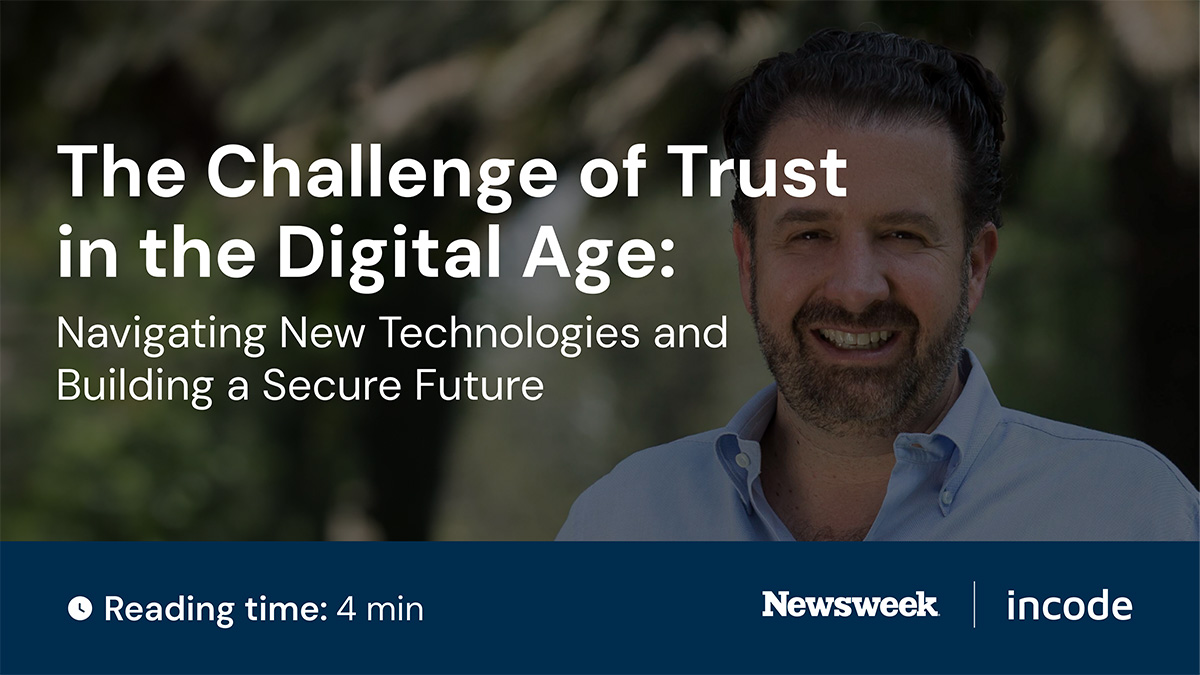The Challenge of Trust in the Digital Age: Navigating New Technologies and Building a Secure Future
By: Ricardo Amper, CEO and Founder of Incode Technologies
There are vital elements to maintain the principles of democracy and ensure that trust remains at the core of our digital world.
In an era where global trust in governments, institutions, and corporations is waning, rapid technological advancements, especially in fields like Generative Artificial Intelligence, pose significant societal challenges. As the central theme of the latest World Economic Forum in Davos highlighted, world leaders must adopt a strategic vision to ensure that innovation and development progress in tandem with trust building.
Data from the World Values Survey underscores a strong correlation between trust and the potential for development and growth. This is particularly pressing in emerging and developing countries. During the Forum, a key focus was on creating safer, more prosperous, and economically inclusive societies through tools like reusable digital identities. These tools are instrumental in reconciling trust among companies, governments, and citizens.
The geopolitical scene at the Forum was largely dominated by discussions on the significant electoral cycle of 2024. For the first time in history, over 4 billion people across 76 countries, representing 51% of the global population, are poised to vote. UN Secretary-General Antonio Guterres expressed concerns about a growing “loss of faith in politics and the economic system,” along with the potential for a chaotic world. Compounding these worries is the threat of misinformation, intensified by AI and other technologies, which could further erode trust and destabilize already fragile democracies.
A LAYER OF TRANSPARENCY AND DIGITAL TRUST
At Incode Technologies, our mission is intricately linked to fostering trust in an ever-evolving digital landscape. As pioneers in creating solutions for a more connected world, we recognize the profound challenges that come with this digital progression. Our response is the innovative development of the Incode Identity Network. This network is not just another layer in the digital ecosystem; it serves as a fundamental component seamlessly integrating into the broader context of identity verification and trust-building.
The Incode Identity Network stands out by harmonizing exclusive access to government records with cutting-edge biometric technology. This fusion results in an unparalleled level of identity assurance, which is essential in today’s digital age. Our approach transcends the conventional boundaries of identity verification, thus embedding a deeper sense of trust in digital interactions.
Central to our network’s capabilities is its role in safeguarding the integrity of democratic processes. Technology plays a pivotal part in combating electoral fraud, enhancing the security of electoral systems, and simplifying the complexities of voter registration and identification. The automation and precision offered by our network not only streamlines these processes but also injects a layer of transparency and reliability. These elements are vital for upholding the principles of democracy and ensuring that trust remains at the core of our digital world.
The World Economic Forum’s discussions on digital security and cybercrime underscored the vital importance of fortifying our digital defenses as we approach 2030. The rapid digitalization across various sectors, including finance and government, has undeniably increased the vulnerability of our global infrastructure to cyber threats. The looming prospect of a digital Armageddon—a scenario were coordinated cyber-attacks cripple key infrastructure, disrupting essential services like telecommunications and financial systems—highlights the urgency of reinforcing cybersecurity measures.
In this context, it becomes crucial to address the most common vector of cyber-attacks: social engineering. This method exploits human psychology rather than technical hacking techniques, making it both insidious and challenging to combat. Social engineering attacks often involve manipulating individuals into divulging confidential information, which can be used to gain unauthorized access to systems and data.
THE ‘PROOF OF LIFE’ A CRITICAL TOOL IN THIS ERA
To combat these sophisticated threats, advanced identity verification methods are indispensable. Biometric technology, coupled with liveness detection capabilities, emerges as a critical tool in this fight. Liveness detection is designed to differentiate between a live person and a fake representation, such as photos, videos, or deepfakes. These deepfakes, increasingly sophisticated simulations enabled by AI, pose a significant threat in social engineering attacks. They can be used to impersonate individuals convincingly, potentially leading to unauthorized access to sensitive information or systems.
By integrating biometric technology with robust liveness detection, we can significantly enhance the security of identity verification processes. This approach not only helps in authenticating individuals with a high degree of accuracy but also in identifying and thwarting attempts using deepfakes or other synthetic identity frauds. The technology’s ability to detect real-time presence ensures that the person undergoing verification is physically present and not a digital impersonation.
Incorporating these advanced identity verification methods is a critical step toward safeguarding our digital ecosystem against social engineering and other cyber threats. Collaborating on the formulation of new regulations that balance innovation with responsible technology use, and integrating these advanced solutions into our cybersecurity strategy becomes not just an option, but a necessity.
As we journey into this new age, expanding the debate and finding better ways to promote full social participation in the economy, improve job access, and significantly reduce fraud in public and private interactions also become fundamental. This can lead to reduced business costs and enhanced trust between companies, governments, and people. Initiatives like the Incode Identity Network are a crucial part of the commitment to secure, reliable identity verification solutions, and exemplify the kind of innovative thinking needed in this digital age. Artificial intelligence is both a potential danger and a potential ally in this quest, which necessitates a collaborative approach among developers, companies, and governments. This collaboration ensures that innovation and development progress in lockstep with trust-building efforts. It’s only through such synergies that we can globally share the benefits of artificial intelligence, fostering more inclusive, prosperous, and secure societies that trust their authorities and corporations.
FIND THE ORIGINAL ARTICLE HERE
